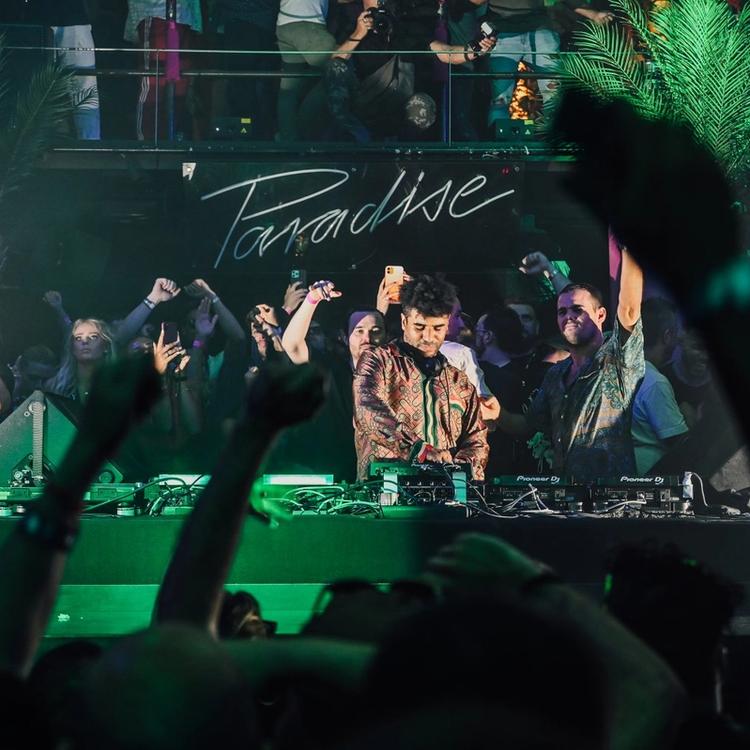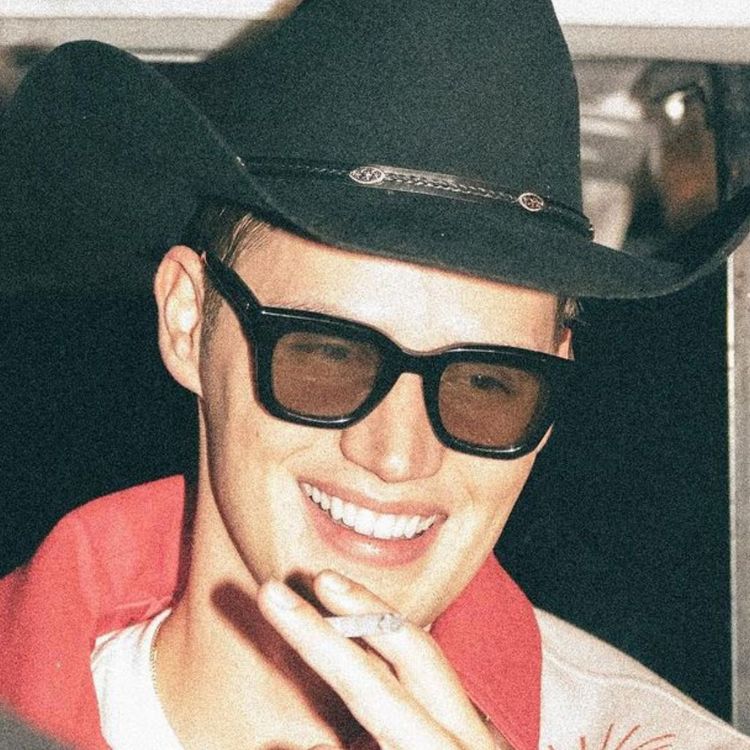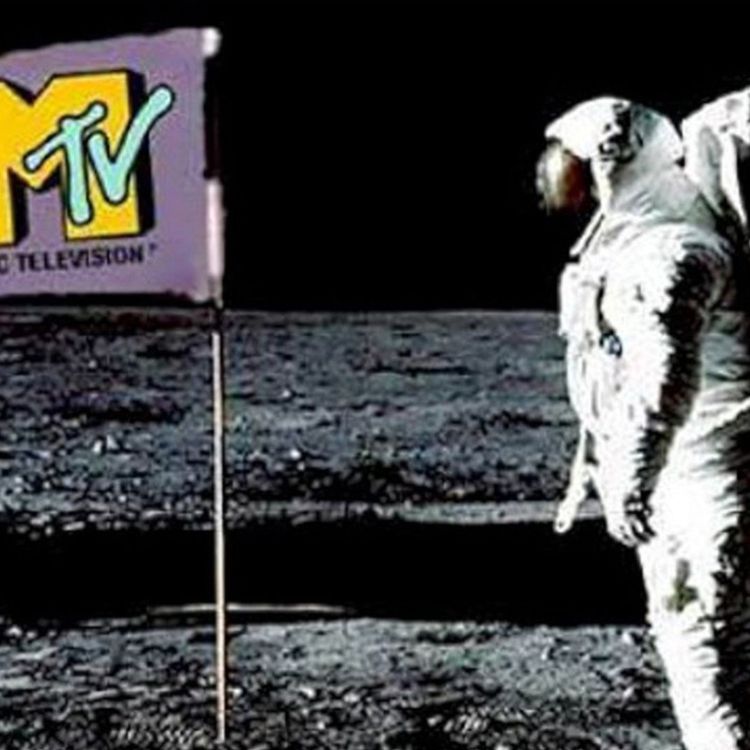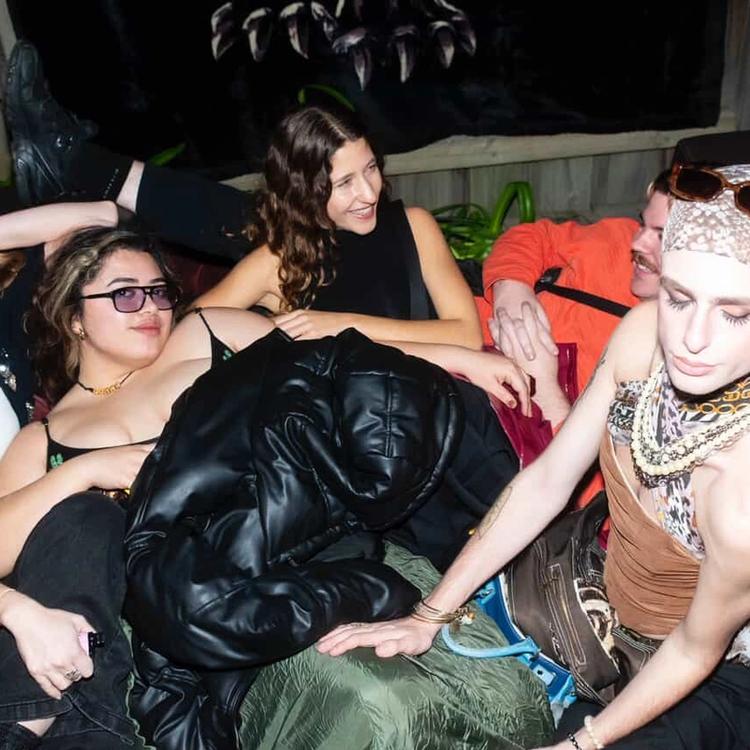Lee Foss Has an Ear for a Good Song
As the blazing Labor Day weekend sun finally sets over Chicago’s Union Park, Lee Foss and contemporary Chicago tech-house pillar Gene Farris are in the thick of a revelrous b2b on Arc Music Festival’s elrow stage. Even for the respective founders of two cornerstone North American-based dance music imprints (Foss with Repopulate Mars and Farris with Farris Wheel Recordings), it’s a definitive performance.
The two Chicago area natives are playing a prime Saturday night slot at Arc, the annual three-day festival which has arguably become the Western Hemisphere’s preeminent house, techno, and tech-house centered extravaganza. There’s hefty historical significance here, too: Union Park lies just two green line metro train stops away from classic Chicago house music club The Warehouse.

As he spins b2b with Farris, Foss wears a classic white Michael Jordan Chicago Bulls home jersey with red satin Bulls away shorts. He sports white Adidas Superstars with offset stripes (three red on the right boot, three black on the left).
The fashionable cherry on top?
A red felt Kangol bucket hat paired with wraparound metallic sunglasses that somehow makes Foss appear authentically classic and wildly futuristic. It’s an outfit that mirrors his career, both hallmarked by a genuine embrace of Chicago’s venerable house music heritage while keeping a keen eye towards the cultural future.

Although many of the artists at Arc are exceptional producers and DJs who have outstanding career achievements, viewing Foss through this hometown lens shows how he stands out in a sea of Jordan jerseys and Chicago house music tropes adorned by attendees and artists alike throughout the boisterous holiday weekend.
For the finale, Foss drops his thumpingly infectious edit of Robin S’s "Show Me Love", the early-90s house masterpiece that became one of the biggest ever house-pop crossover hits when it reached number five on the Billboard Hot 100. Now, the wildly pulsating crowd surrounding the elrow stage’s psychedelic carnival goes absolutely bonkers as one of the most recognizable melodies in house music history hits the mix.
“I've played in Chicago so long as a local DJ that I always knew how to come here and deliver, and be great at Spybar and festivals,” Foss tells Gray Area moments after walking offstage to unwind and collect his thoughts from inside a modestly equipped RV-turned-green-room.

It’s a strange place for quiet reflection.
“I've known the sounds,” Foss says with humble earnestness.
Outside, a deep rumble from massive stacks of festival speakers and tens of thousands of ravenous house and techno fanatics rhythmically rattles the RV door as John Summit’s main stage closing set rages on.
“What’s changed in the [dance music] culture in America?” Foss ponders aloud.
It’s a question whose answer begins with a glimpse into the past.
MISSING LINK
“I came in[to dance music] at an interesting time-point, when I became good enough to release,” Foss remembers. “Minimal had taken over — there wasn't a lot of interest in Chicago house.”
Foss’s well-documented emergence from his Chicago area roots came in the mid-to-late 2000s. That’s when his burgeoning production career was developing alongside longtime collaborator Jamie Jones.
“Jamie and I were best friends, and we had this history together. People knew about me first as I started to produce,” Foss remembers. “We created what became the Hot Natured / Hot Creations sound.”
“It was very musical,” he says of his trailblazing collaborations with Jones, a hint of nostalgia rising in his voice. “Some of it cut in pop samples [and] pioneered bringing hip hop, R&B, and disco into that baseline-driven deep house. At [that] time it was pretty different from what was going on.”

Foss and Jones’s gravitation towards innovation and disregard for hewing along with popular genre trends is a mindset Foss has had since early in his career.
“Even when I was a local [Chicago] DJ, I was always quite different — playing Metro Area and electro house, Get Physical stuff mixed with deep house, mixed with Naked Music,” he says. “I was getting booked by Smart Bar, playing with Dixon and Jazzanova and Metro Area. Playing a lot of gigs like that.”
Now backstage at Arc, Foss reflects on those foundational Chicago experiences, his artistic evolution moving to Los Angeles, and the many journeys across the Atlantic between North America, Europe, and the Ibiza bubble. He’s an intriguing nexus between classic Chicago house music and newly-emerging styles of tech-house, house, and techno subgenres.
“I definitely have my own lane. But I'm such a strong songwriter with concepts, and I like to experiment,” Foss tells Gray Area. “So I think I'm kind of a missing link in some respects.”
That’s a tidy understatement — Foss has been bridging key gaps across dance music genres and subgenres for nearly two decades. For example: this confident passage from a glowing April 2013 article by Paul Lester of The Guardian about Foss and his Hot Natured bandmates modern connection to classic house:
“We keep using the word "dance" when really we should be describing [Hot Natured] as house. They draw on the rhythms, production and vocal sounds and melodies of classic house,” Lester then wrote. “We [at The Guardian are] not sufficiently au fait with contemporary developments in house to establish whether they are advancing the genre or merely casting back to its golden era, but it's definitely [classic Chicago] house: a brief listen to their music will undoubtedly stir heady memories of nights at Shoom.””
Now a decade since Lester’s article was published by The Guardian, Foss further continues warping dance music by setting new sonic boundaries across genres with his label Repopulate Mars, which he founded in 2016. He still oversees A&R at the label, although nowadays that includes Kaysin, whom Foss brought onboard to assist in curating both parent label and sub label South of Saturn. Foss also conceptualizes and oversees almost all of the label’s visual content.

“Repopulate Mars is very much a label where I'm able to consider things that have original vocals from mainstream top 40 rappers as easily as the most underground artists,” he says. “No one's gonna bat an eye” at what Repopulate decides to release, Foss notes with confidence.
Foss is correct.
His resume is unimpeachable, and it’s hard to discount Repopulate’s current status as one of the most influential labels in the tech-house scene (the other being Chris Lake’s explosively popular Black Book Records). Foss disagrees with the conventional wisdom in just one aspect here — not on a point of his career bonafides nor on Repopulate’s broader place in dance music culture, but with how Repopulate has been generally boxed-in as a tech-house label.
“[Repopulate Mars] is considered tech-house because everyone's lazy,” Foss tells Gray Area with an air of minor annoyance. “They don't really listen. Like the Kilhoffer record that came out [on Repopulate] is an amazing deep house record. There's plenty of discovering guys like Ben Hemsley, Mason Talbot. That was never tech-house.”
For Foss and Repopulate Mars, discovering new artists rather than developing them in house is how the label remains so forward-thinking. That’s why Foss is frustrated when his label is clumsily defined as an exclusively tech-house outlet. “The songs and the Camelphat songs were made for Repopulate Mars,” Foss explains.
He says that those tracks were published without top-down label input being pushed onto producers. “I never listen to the demos,” he says, preferring to evaluate the merits of polished final products rather than cranking out label-produced tech-house genre cutouts.

Some products of Foss’s drive to continually evolve: Repopulate Mars’ six Beatport number ones, alongside Mau P’s gold record single Drugs From Amsterdam, which has over 100 million streams in the year following its release.
“It's going to be with us for 20 years,” Foss says of Mau P’s instant classic.
The rising ubiquity of such tracks and such artists in dance music culture during the current tech-house boom is something that “Jamie and I had a big part in starting, and now it's huge,” Foss says. “A lot of the guys who are the biggest current new artists have a long history of me more or less discovering them, us teaching classes together, [and] influencing each other's production.” That list includes Michael Bibi, John Summit, and Eli Brown, for Foss to name just a few.
“It’s important to stay cutting edge — to stay on top of the label being interesting. But I never felt it was one sound” that exclusively defines Repopulate, says Foss. “I’m in a really lucky position that I’ve started several other labels,” he adds. “It allows me too compartmentalize to some extent.”

“And now, if it's something that I want to take to the next level, then I need to step up. It’s an exciting time, and I'll just continue to evolve.”
It’s hard to pinpoint what Foss might do with his creative energy next. Repopulate is at an all-time high, and it’s been a year since he joined forces with Jamie Jones for a global tour celebrating the ten year anniversary of Hot Creations.
What could be the next big step in Foss’s overall artistic evolution?
“Me and Jamie are starting another label,” Foss casually announces to Gray Area.
Imagine those possibilities.
HAVE AN EAR
As musical tastes have evolved over the last two decades, Foss has never had major trouble keeping up as a pacesetting DJ, producer, and label executive.
Why has his music been so popular for so long?
“I just have an ear for a good song,” he says.
What Foss means is that he has an uncanny ability to understand how sounds suit both his own tastes and those of potential audiences. And for him, that’s a required attribute for anyone looking to make an impact on the North American dance music scene.

“You have to have an ear if you want to be the headliner at a lot of these events and play in Phoenix, Tampa, and Orlando,” Foss reasons. “You’ve got to have an ear that can both reach people who are coming from a very mainstream sound and people with a critical ear.”
“But if artists don't do their homework and they come [to America to] play the way they play at Circoloco — it’s [too] niche,” he explains. “Those types of artists “are not going to headline this festival,” Foss notes with confidence.
There’s differences in taste between North American and European audiences which frames how Foss plays on either side of the Atlantic.

Lee Foss & Jamie Jones in Ibiza, 2002
“Definitely in North America I am more likely to play a few more things that have recognizable vocal samples. When I've been playing in Ibiza, I have been playing more skippier things that are maybe classed as minimal,” Foss says. “But when I play Paradise, or when I play Pasha with Claptone, I feel like I can be an alternative.”
Foss’s versatility as a DJ is yet more evidence of an undefinable artistic alchemy that appeals to the many pockets of au courant dance music consumers across the globe as well as all those with more mainstream sensibilities.

In short: Lee Foss has an ear for a good song.
Maybe that’s why he’s been able to make such a big impact on the dance music world.
As for the accolades and awards, Foss says that’s all been “nice.” He’s grateful for the recognition. But he’s also frank when telling Gray Area that those prizes are not what motivates him as an artist.

“At the end of the day, whether I ever won a Grammy, add two dozen of those plaques on the wall,” he says. “What’s gonna matter a lot more is that I know what I'm doing is authentic.”
Foss has one central goal for Repopulate Mars moving forward: “To continue to be a platform for everyone to grow and to make great, great music,” he says as the conversation concludes.
“So that's the plan.”




































